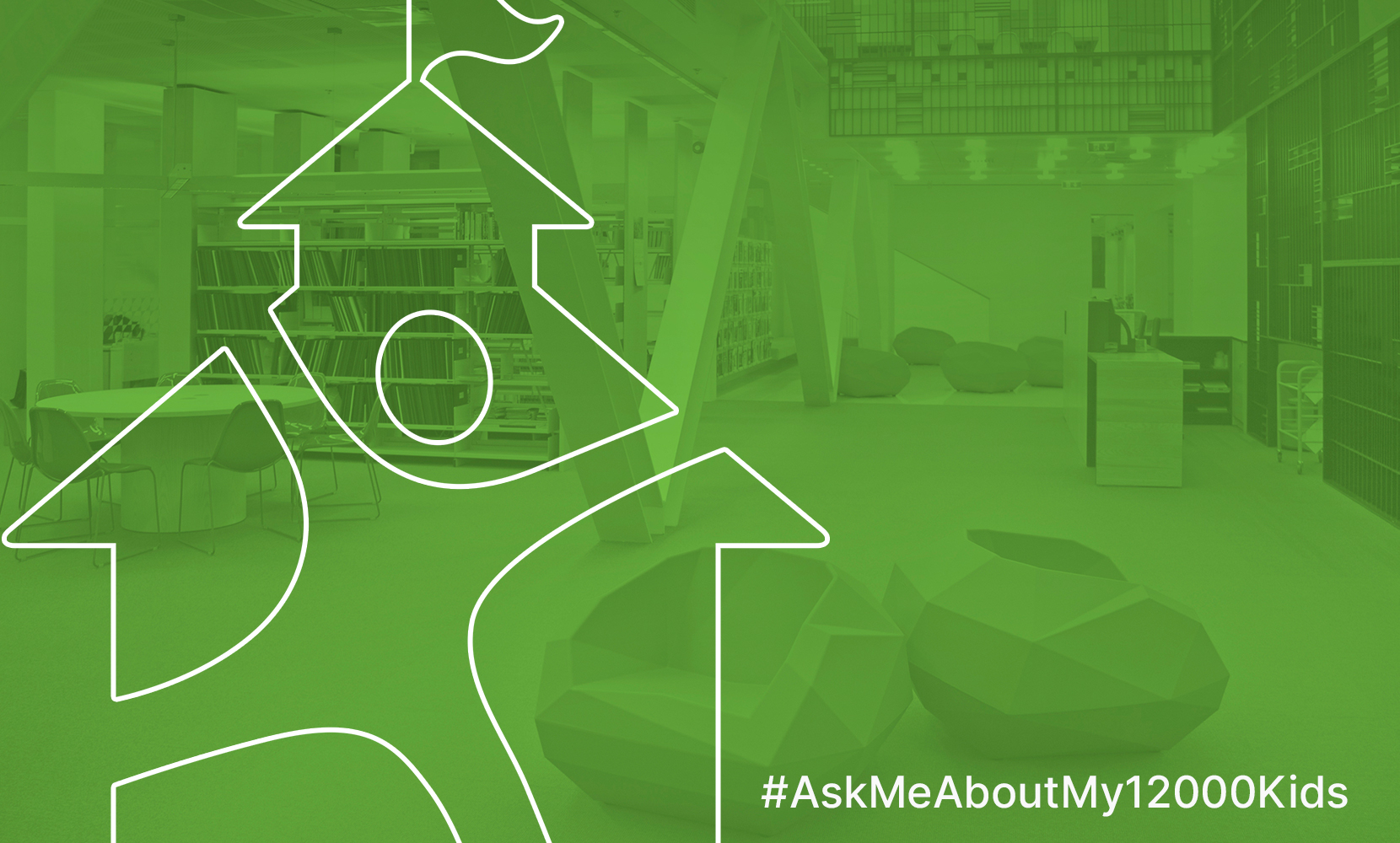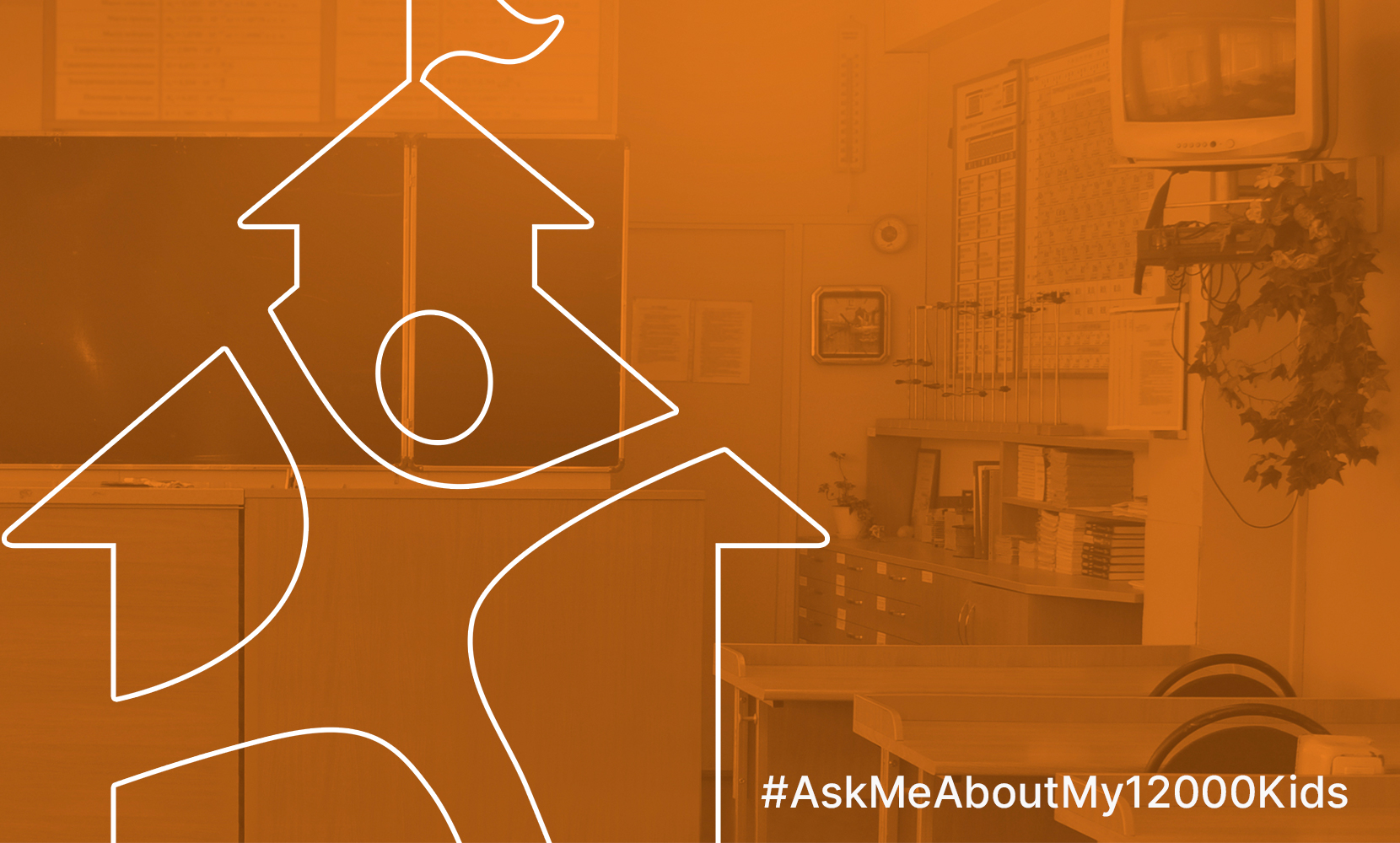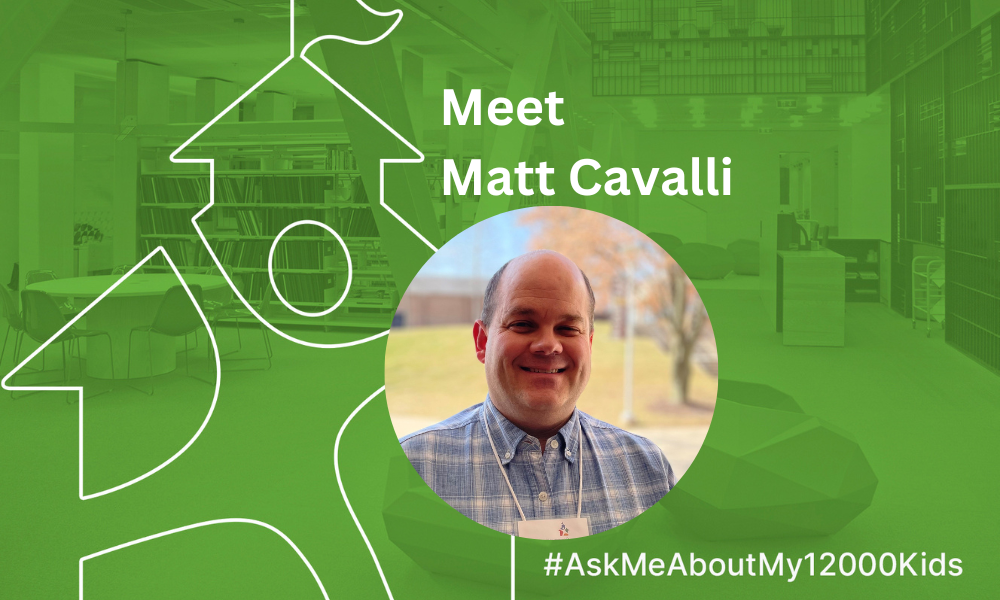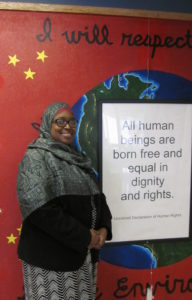 Welcome back to the POP QUIZ! This is a regular, yet totally unexpected, feature where we ask students, parents, staff, our friends, and partners to answer a few questions about what they are learning, reading, and thinking about. Today we feature Principal Amira Mogaji.
Welcome back to the POP QUIZ! This is a regular, yet totally unexpected, feature where we ask students, parents, staff, our friends, and partners to answer a few questions about what they are learning, reading, and thinking about. Today we feature Principal Amira Mogaji.
Principal Mogaji was working as the CEO/Head of School at a Montessori school in her hometown of Philadelphia when she was recruited by Kalamazoo Public Schools to lead its Northglade Montessori Magnet School. Now in her eighth year as principal, she says, “I love making a difference here and helping our students achieve the Kalamazoo Promise.”
Principal Mogaji serves on the Anti-Bias/Anti-Racism (ABAR) committee at both the school and district level. Her leadership extends beyond the district as she is a board member for Montessori for Social Justice as well as the American Montessori Society (AMS), the national board governing body for American Montessori schools in the U.S. and abroad.
She and her husband, Olatubosun, have six children at home. This includes: one KPS graduate who is in WMU’s aviation flight science program, two who attend Northglade, and three “little, little people,” including two-year-old twin girls.
Oh, and if that isn’t enough, she is also working towards completing her dissertation for a doctoral degree in Educational Leadership and Management.
We met in the school’s Peace Room. Peace education is an essential component that is infused throughout a child’s Montessori education. Mogaji’s own passion for engaging in peace and justice work flows through her work, home, and community life. Peace and justice isn’t something that just happens. It is challenging, hard work and, as you will discover, Mogaji doesn’t take the easy way out when conflicts arise. Instead of choosing to disengage or yell back with an unkind remark, Mogaji, always mindful of the example she is setting, responds from a place of peace.
Alright, Principal Mogaji: pencil out, eyes on your own paper. Good luck.
Pop Quiz
You clearly enjoy welcoming students in the morning, don’t you?
Greeting kids in the morning is my favorite part of the day. I love to see their faces and feel their energy coming into the building. I can quickly discover if someone is struggling and it’s an opportunity to check in with parents, too.
Two days a month I’m not here as I have meetings and I miss it. Otherwise, I’m out there in rain, snow, monsoon, you name it. Everybody deserves a hello and it may turn somebody’s day around. It’s important how you come into the building.
I’m always struck by the sense of peace and zen-like atmosphere of your school. As the leader of the building, I’m sure you have a hand in creating this environment. You seem to radiate peace.
Thank you. I’m not always zen, as my kids can attest to when I am trying to get ready for school each morning. [She laughs.] Hurry up, we can’t be late! For the most part, though, things don’t ruffle me.
What does ruffles you?
Dishonesty bothers me a lot, to the point that I have to manage how I manage that feeling. In my personal life, if I find you to be dishonest, I’m not going to bother with you. I’m a bubbly person and I love everybody until I find you to be dishonest. That said, when it comes to my work, I don’t have the right to not give 100 percent of myself. I must be intentional and give everybody the same support.
What is something interesting you’ve recently learned?
When twins learn how to, one: get out of their cribs and, two: open the door, your life changes forever. Life as you know it, is over. [She laughs heartily.] I haven’t slept since Wednesday!
What are you currently reading?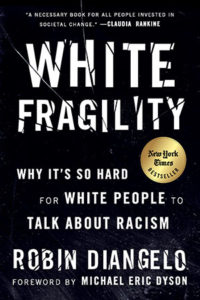
White Fragility by Robin DiAngelo.
I haven’t read it yet, but I’ve been reading a lot of articles about it [like this one].
It’s nice for this book to come out; some things can’t come from people of color. [The author and anti-racist educator, Robin DiAngelo, is white.]
It helps to explain the difficulty of doing anti-bias/anti-racism work. People who want to do this work—and I believe everybody has good will—but you find people automatically start blocking things and they become defensive. I see it all the time. They want to do the work and then they get stalled. The book helps explain this.
Anti-bias/Anti-racism work is not something that is not done to people. But rather, it is what you do with yourself, in your own journey of self-transformation. All of us need to go through it and become the best we can be. This book can help with that. I have friends who are white who love the book and it is helping them on their journey and I have friends of color who love it as well. It’s helping them, too.
May I ask what, as a Muslim woman, has been your own experience with bias and racism?
I’m always randomly selected at airports. I have been yelled at and told to get out of this country and go back home. My car has been vandalized in the Walmart parking lot. I was in the doctor’s office with my children and in the waiting area we were yelled at and called terrorists. Unfortunately, over the past few years these kinds of things have been happening more often.
That is stressful. How do you handle that?
I carry my passport at all times. And when it comes to flying, since I’m always randomly selected I have to add an additional hour and a half or more to my schedule so I won’t miss my flight…
Honestly, it stresses me out to think that some people are afraid of me… My self-care is walking around Walmart and buying things I don’t need [laughs heartily]. In fact, I was there recently and one of the ladies who worked there informed me she was okay with me being covered. This I can handle, she said. But if you had all black on, I wouldn’t like that. I’d be afraid of you. A lady who worked at Walmart felt she could say that to me, in front of other people.
Incredible. How do you respond to something like that?
The way I see it, my job as a person—as a covered, black, woman—is to set the best example I can so that when situations like that occur, people will think, Oh, that was a nice lady. You need to set a good example and give a good experience to people. You may be the only contact they’ve ever had with a Muslim.
Where else, besides Walmart, do you like to frequent in the community?
The public library. Always!
What is your favorite word right now?
Intentional. I try to be intentional in everything I do. My second favorite word is kindness.
Can you tell us, from your perspective as a principal, what it is like to have CIS in your building?
I love CIS! My experience has been very positive. Over the years, we’ve had a few staff and they have all been strong people. I’ve been most appreciative about the people and the way in which Pam [Kingery] and those helping with staffing Northglade do this. CIS understands that we are a unique school. All schools are unique, but we are really unique and CIS takes that into consideration. They have always invited me to come in and participate in interviews.
The way CIS operates in the building, whether it’s during the day [post about CIS Site Coordinator Steve Brewer here] or when Ashley [Serio] is running the after school program, it doesn’t feel like a separate entity. We’re working together to support kids. I laugh with the CIS staff every day. We have fun! It’s those relationships that children see—between CIS staff and the teachers and administration—and how we are all here together. We’re a family. Children can’t go to mom because they don’t like what dad says. We are one, collective voice.
CIS really remove barriers for children. It’s just a wonderful program!
What drew you to Montessori?
I knew of it when I was a student at Chestnut Hill College and had learned some about the philosophy having taken a Montessori class in elementary education. But I fully appreciated the beauty of it when I was a CEO/Head of School in a Montessori school in Philadelphia. It was in a very poor area with a high percentage of socio-economically disadvantaged students. It was awesome working there…
Montessori is a great way to educate children in an urban setting. That is the reason why I’m here: on the northside of Kalamazoo, in a Title I, American Montessori Society accredited Montessori public school, providing high quality Montessori education to children who would not otherwise have an opportunity to have it.
We have one of the lowest behavioral referrals in the district.
Why do you think that is?
There is a level of respect children have for each other here. That is because Montessori emphasizes respect for self, for others, and for the environment. We focus on the whole child and our children have opportunities to meet Montessori outcomes which are not all academic, such things as responsibility, global citizenship, and self-regulation. They learn to walk to the bathroom without the whole class—in kindergarten they are learning that. They have freedom within limits and as self-directed learners, they are figuring out how to prioritize their work, a skill some students may not learn until college! So while our children are learning to read, write and do math, it is also important to learn things like, How do you care for others? How do you help someone in need? What if someone is hungry?
We all recently learned that one in six children in Kalamazoo go hungry. We know this because the upper elementary students researched hunger, they wrote persuasive essays, and went from class to class sharing what they learned. Hunger, they said, is not justice. The children collected food and donated it to Kalamazoo Loaves & Fishes.
A Montessori education provides opportunities for those kind of conversations to exist. We support the children in what they want to learn more about—whatever that is. We all have a place in the world and it’s our job to find out what our responsibility is in it.
My husband says Islam is a way of life. It’s not about ‘when do you pray?’ It’s more about what kind a person you are. It’s about giving back to the world. The same is true for Montessori. It is a way of life. It’s about how you treat children, giving them opportunities, and meeting them where they are at—that is very important. Follow the child. That is a famous Montessori quote: Follow the child.
Not necessarily an easy thing to do.
When children do get off task, we have conversations, reflecting on how can you be respectful to yourself? Others? Your environment? You are not getting all you need because you are not doing your work. So what do you need? What is it you are not getting? These are the conversations we have with each other and that is the beauty of it.
With Montessori, we’re offering children options in their learning environment. Today, do I want to read sitting in a chair or work on the chalkie [a moveable table] or floor? That’s one less argument to have. We don’t have to be on their backs all day.
I happen to think we have the most wonderful children in the world!
What’s your philosophy of leadership?
A leader is there to serve, and to serve everyone. Leaders set a good example and model the expectation…We have lots of leaders here—students and teachers—and my job is to grow the leaders in this building.
Behind every successful person is a caring adult. Who has been your caring adult?
Obviously, my parents. And I have a really wonderful and supportive husband who gives me the strength I need to take risks. I trust him and he’s wise. He doesn’t just say, Go for it. He says, You should do this because of a, b, and c reasons. Take, for example, my being on the board of directors for the American Montessori Society. I never would have submitted my application and run, except for his encouragement. While I wasn’t sure about it, he pointed out that they contacted me about running. They’re reaching out to you about doing this because you are the best, he’d said.
I never would have put myself out there like that, in that arena of running for an elected position, without his support. He really has been most influential in my life. We’re partners in everything.
I have to add that my children make me want to be my best self. While they don’t say it, we are models for our children… If I see them fussing or not being kind—of course, sometimes it may be a developmental stage—but I can’t help but wonder, what in the environment is causing the child to act this way? Have I been fussy lately? Do I need to adjust myself? That’s a Montessori way of thinking.
Thank you, Principal Mogaji, for hanging out with us at Ask Me About My 12,000 Kids.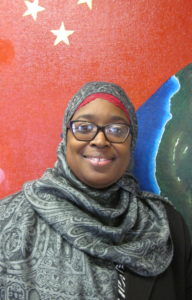
In the weeks to come we’ll be featuring Ashley Serio, a graduate of Kalamazoo Public Schools and Northglade Montessori’s CIS After School Coordinator. In the meantime, practice peace with yourself, your neighbors, friends, and strangers at Walmart.
Tags: American Montessori Society, Amira Mogaji, anti-bias/anti-racism, Ashley Serio, Chestnut Hill College, Communities In School of Kalamazoo, hunger is not justice, Kalamazoo Loaves and Fishes, Kalamazoo Promise, Kalamazoo Public Schools, leadership in the schools, Montessori for Social Justice, Northglade Montessori Magnet School, Pam Kingery, Robin DiAngelo, social justice, Steve Brewer, White Fragility


